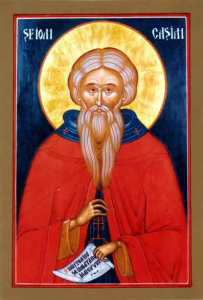 According to the measure of its purity…, each mind is both raised and moulded in its prayers if it forsakes the consideration of earthly and material things so far as the condition of its purity may carry it forward and enable it – with the inner eyes of the soul – to see Jesus either still in His humility and in the flesh, or glorified and coming in the glory of His Majesty.
According to the measure of its purity…, each mind is both raised and moulded in its prayers if it forsakes the consideration of earthly and material things so far as the condition of its purity may carry it forward and enable it – with the inner eyes of the soul – to see Jesus either still in His humility and in the flesh, or glorified and coming in the glory of His Majesty.
For those cannot see Jesus coming in His Kingdom who…cannot say with the Apostle: “And if we have known Christ after the flesh, yet now we know Him so no more” (2 Cor. 5:16), but only those can look with purest eyes on His Godhead who rise with Him from low and earthly works and thoughts and go apart in the lofty mountain of solitude – which is free from the disturbance of all earthly thoughts and troubles, and secure from the interference of all sins, and which, being exalted by pure faith and the heights of virtue, reveals the glory of His Face and the image of His splendour to those who are able to look on Him with pure eyes of the soul.
But Jesus is seen as well by those who live in towns and villages and hamlets, i.e., who are occupied in practical affairs and works, but not with the same brightness with which He appeared to those who can go up with Him into the aforesaid mount of virtues, i.e., Peter, James, and John. For so in solitude He appeared to Moses and spoke with Elias.
And as our Lord wished to establish this and to leave us examples of perfect purity, although He Himself, the very fount of inviolable sanctity, had no need of external help and the assistance of solitude in order to secure it – for the fulness of purity could not be soiled by any stain from crowds, nor could He be contaminated by intercourse with men, who cleanses and sanctifies all things that are polluted – yet still He retired into the mountain alone to pray.
In this way He taught us by the example of His retirement that if we too wish to approach God with a pure and spotless affection of heart, we should also retire from all the disturbance and confusion of crowds, so that while still living in the body we may manage in some degree to adapt ourselves to some likeness of that bliss which is promised hereafter to the saints, and that “God may be” to us “all in all” (1 Cor. 15:28).
John Cassian (c. 360-435): Conferences 10, 6 [slightly adapted].









